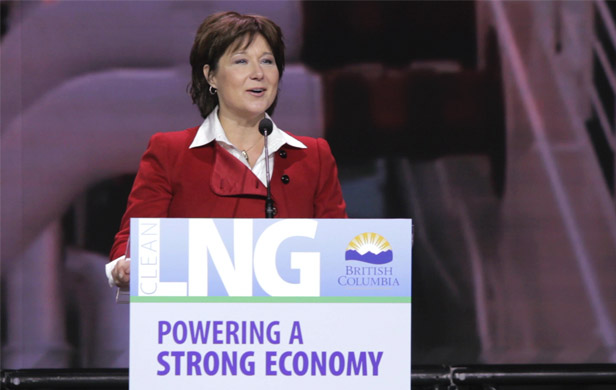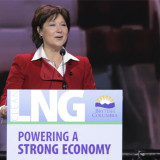
This is a guest post by Mark Jaccard, professor of sustainable energy at Simon Fraser University and a convening lead author in the Global Energy Assessment – republished with permission from desmog.ca
During B.C.’s 2013 election campaign, at a conference of energy economists in Washington, D.C., I spoke about how one of our politicians was promising huge benefits during the next decades from B.C. liquefied natural gas exports to eastern Asia. These benefits included lower income taxes, zero provincial debt, and a wealth fund for future generations. My remarks, however, drew laughter. Later, several people complimented my humour.
Why this reaction? The painful reality is that my economist colleagues smirk when people (especially politicians) assume extreme market imbalances will endure, whereas real-world evidence consistently proves they won’t. For B.C. Premier Christy Clark to make promises based on a continuation of today’s extreme difference between American and eastern Asian gas prices was, to be kind, laughable.
Shale gas its own worst enemy
For many years, natural gas prices differed little from one region to another. But the shale-gas revolution in the U.S. in the past decade created a glut, causing rock-bottom prices in North America. Meanwhile, prices in eastern Asia were pegged to the price of oil, which has risen. These two trends led to a price divergence starting in 2008. By 2012, Japanese gas prices were more than four times higher than North America’s.
The Asian equation
If that difference was to hold for several decades, producers could earn sufficient revenues from Asian sales to cover shale gas extraction, pipeline transport, cooling to liquid in LNG plants, shipment across the Pacific, healthy profits, and billions in royalties and corporate taxes. That’s an attractive image in an election. But it can quickly become a mirage as gas markets behave like markets.
In competitive markets, a price imbalance triggers multiple profit-seeking actions, which work to eliminate the difference — usually sooner than expected — by those hoping to benefit from it. In this case, there are many potential competitors for the gas demands of China, Japan and their neighbours. China can invite foreign companies to help develop its massive shale gas resources. It can buy from Russia, which has enormous gas resources. It can also buy from other central Asian countries, such as Kazakhstan. It can also encourage a bidding war between prospective LNG suppliers from many parts of the world, some of which will have lower production costs than B.C.
[signoff3]
The result will push down the price in eastern Asia. As was easily predicted by my smirking colleagues, it’s already happening. Unofficial reports put the price of a recent gas contract between China and Russia at $10.50 per million British Thermal Units, far below the peak Asian price, and close to (if not below) the cost of sending B.C. gas to China. At this price, there will be no government royalties, no lower income taxes, no debt retirement, no wealth fund. Maybe no LNG plants.
BC plants would cut corners
If any LNG plants are built in B.C., they will likely be constructed and operated as cheaply as possible, which will put the lie to another promise of Clark’s. In a province with legislated targets for reducing carbon pollution, she promised B.C. would have “the cleanest LNGproduced anywhere in the world from well-head to waterline.”
As it turns out, this promise is easy to verify. Experts know the cleanest LNG in the world is the Snohvit project in Norway, which emits 0.35 tonnes of CO2 per tonne of LNG. The under-construction Gorgon facility in Australia will match it.
But, public documents indicate British Columbia’s proposed LNG industry will be three times worse, producing one tonne of CO2 per tonne of LNG. Were three such facilities built as proposed, they would bring oilsands-scale carbon pollution to B.C., doubling our current emissions and making it impossible to meet our legislated targets.
We could build the cleanest LNG systems in the world. This would require reducing methane leaks from processes and pipelines, capturing and storing carbon pollution, and using renewable energy to produce electricity for processing and cooling natural gas, as Clean Energy Canada has recently showed.
But this is unlikely, especially as those Asian gas prices fall. So brace yourself for another barrage of Orwellian doublespeak from government and industry, in which cleanest means dirty, great public wealth means modest private profits, and revised climate targets mean missed climate targets. No doubt my economist colleagues will be amused. But should they?
Follow Professor Mark Jaccard on Twitter @MarkJaccard


Citizens Realize, we must use our laws. 2006 FC 1053 at note 8: “These colonial limitations have now disappeared, by convention if not by law, as the British Empire has evolved into the Commonwealth, and the colonies have evolved into independent states within the Commonwealth. Indeed, Canada’s Sovereignty was acquired in the period between its separate signature of the Treaty of Versailles in 1919 and the Statute of Westminster in 1931.
Att. to – Executive Council Act and Privy Council
1. The Executive Council shall be composed of such persons as the Lieutenant Governor from time to time appoints, and all executive councillors so appointed are ministers of the Crown
— removes the elected representative of Citizens, you no longer speak for or sign for Citizens
— there is only one representative of the Crown allowed in Parliament and Legislative Assemblies your votes are nullified, no force or effect.
— you swear alligence to a crown corporate entity, a servant of, you cannot associate or be involed in trying to be part of a Free and Democratic Society, in the Commonwealth.
We the Citizens of Canada and Subjects of Our Laws, not the Crown or Government, we have made laws against the Authorities you are associated with. eg: Emergencies Act, CCRF
Figueroa v. Canada(AG) Quote – In a Democracy, Sovereign Power resides in the People.
Interpretation Act –
– Government of BC or of Canada means Her Majesty in right of…
But – “Canada” means “Canada”
1986 BCSC 1044 (15) “the Sovereign” is simply a modern form of the prerogative writs which were commands by the Sovereign ensuring obedience to the law.
The Crown In Law Prevails over the crown in (g)Governments
Commonwealth leaders agree to strengthen Ministerial Action Group (CMAG)
28 October 2011
Approval in Perth follows recommendation of the Group set up to deal with serious or persistent violations of Commonwealth values and principles
· CMAG will continue to respond as before to instances where there is an unconstitutional overthrow of an elected government.
i. The unilateral abrogation of a democratic constitution or serious threats to constitutional rule;
ii. The suspension or prevention of the lawful functioning of parliament or other key democratic institutions;
iv. The systematic denial of political space, such as through detention of political leaders or restriction of freedom of association, assembly or expression;
The following developments could also be taken into account:
ii. The abrogation of the rule of law or undermining of the independence of the judiciary
iii. The systematic violation of human rights of the population, or of any communities or groups, by the member government concerned;
Measures to address the unconstitutional overthrow of a democratically
elected government are already set out in the Millbrook Action
Programme. These should continue to guide CMAG, but should be
refined as follows to take into account the working practice that has
developed over time in response to such situations:
12 Immediate public expression by the Secretary-i. General of
the Commonwealth’s collective disapproval of such a serious
violation of its fundamental political values;
ii. Early contact by the Secretary-General with the de facto
government, followed by the offer of Good Offices and
appropriate technical assistance to facilitate an early restoration
of democracy;
Criminal Code of Canada
15. No person shall be convicted of an offence in respect of an act or omission in obedience to the laws for the time being made and enforced by persons in de facto possession of the sovereign power in and over the place where the act or omission occurs.
RS,c.,C-34,s15
1999 FC 8053 In that unanimous judgment MacGuigan J.A., citing Lord Devlin in Rookes v. Barnard, [1964] 1 All E.R. 367 (H.L.), noted that “”outrageous” or “oppressive” conduct on the part of the Government is quite different from similar conduct by powerful corporations or individuals, and that it is much more serious, “for the servants of the government are also the servants of the people and the use of their power must always be subordinate to their duty of service”” (at 615). As Muldoon J. had done at trial, the judges of the Court of Appeal recognized that the defendant”s conduct fell into the category of “oppressive, arbitrary or unconstitutional action by the servants of the government”. The Court also recognized that “malice is not necessary for the existence of “oppressive, arbitrary or unconstitutional action by the servants of the government””.
Can you please email this to Christy Clarke. With instructions on how to open a email message. Then someone that knows how to read can read her a bedtime story that is not some sort of FICTION
Professor Jaccard.
There is absolutely no point in providing the Premier with statistical anaylsis or irrefutable facts.
She doesnt get it.
This is a person that requires help tying her shoes in the morning so anything that involves thinking is a waste of time.
However I do appreciate your analysis and look forward to future contributions
I do believe you put it succinctly. Bravo!